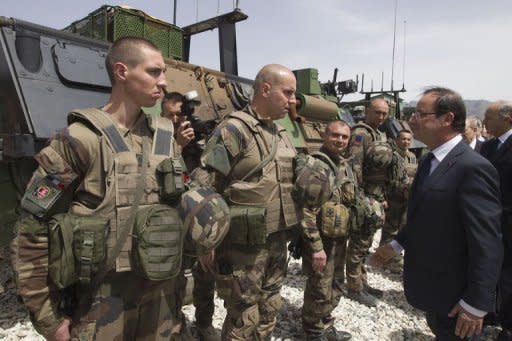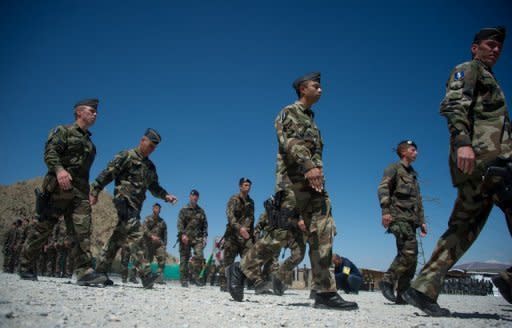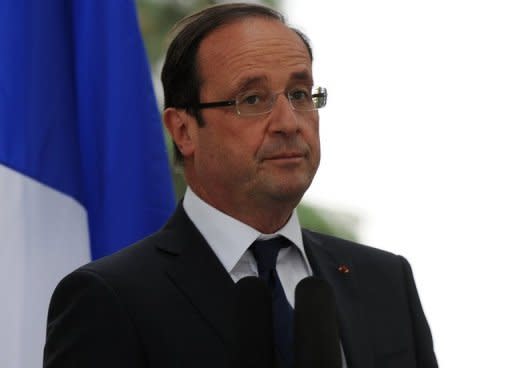Hollande defends French exit in Afghanistan
President Francois Hollande on Friday defended France's imminent exit from Afghanistan, saying 2,000 combat troops will leave in a coordinated withdrawal this year but vowing not to abandon the country. Hollande met French soldiers deployed in the volatile province of Kapisa and held talks with Afghan President Hamid Karzai on his first visit to the country where French troops have been fighting the Taliban since late 2001. He explained his decision to recall French combat troops by the end of 2012, a year earlier than Paris initially planned, and two years before NATO allies. "It's a sovereign decision. Only France can decide what France does," he told soldiers at Nijrab Base in eastern province Kapisa, where most of France's 3,550 troops in the country are based. "It will be conducted in good understanding with our allies, especially President (Barack) Obama, who understands the reasons, and in close consultation with Afghan authorities," Hollande said. Kapisa, which commands part of the access to Kabul from Taliban flashpoints on the Pakistani border, has proved a tough fight for the French, troubled by turf wars between the Islamist insurgents and drug dealers. Hollande said the threat posed by terrorists in Afghanistan had not been eradicated but had been "partially curbed" since the 2001 invasion toppled the Taliban regime for sheltering Osama bin Laden after the 9/11 attacks. In a news conference with Karzai, he said France wanted to help Afghans become self-sufficient, by focusing on education, culture and even archaeology. He also mentioned economic "prospects" in housing, renewable energy, oil exploration and agriculture, but stopped short of providing any details. Paris has so far reserved judgement on contributing to the cost of the Afghan security budget, estimated at $4.1 billion a year from 2015. "We want France to stay in Afghanistan in a different guise than in the past," he said, adding that the counter-terror mission "was on the point of completion", which should be a matter of "great pride". By the end of the year, there would be no more French combat troops in Afghanistan, he said. "We will repatriate 2,000 people. At the beginning of 2013, the only personnel will be in charge of repatriating our equipment." Hollande later met members of the local French community at the French embassy before leaving Afghanistan after a visit of some eight hours. France, which has lost 83 soldiers in Afghanistan, provides the fifth largest contingent to NATO's 130,000-strong US-led force. Allies have downplayed the effect of their early departure, saying Afghan troops are ready to take over. The relatively quiet Kabul district of Surobi, where French troops are also based, was handed over to local control in April. Kapisa has been included in the third of a five-phase transfer, which Afghan officials say could take as little as six months, but which NATO's International Security Assistance Force has timetabled at 12-18 months. Analysts have expressed concern about NATO's withdrawal, pointing out that Afghan forces have a mixed record at best and questioning whether a security vacuum will only heighten violence if not hasten a return to civil war. "Clearly there is a rush for the exits by Western leaders, but there is no Plan B to address worsening battlefield conditions and political crises if they occur," wrote veteran Afghan watcher, Ahmed Rashid, in The New York Review of Books. Separate bomb attacks on the day of Hollande's visit killed five people and wounded at least 11 others in the south, officials said. More Afghan civilians died in 2011 than the total number of NATO troops, 3,009, killed since 2001. And last year's 3,021 civilian deaths marked the fifth straight year that the toll has risen, according to UN figures. The number of internal refugees last year hit nearly half a million, the highest for about a decade, part of what Amnesty International has called "a largely hidden but horrific humanitarian and human rights crisis".





